Come join us now, and enjoy playing your beloved music and browse through great scores of every level and styles!
Can’t find the songbook you’re looking for? Please, email us at: sheetmusiclibrarypdf@gmail.com We’d like to help you!
Table of Contents
What are Karl Jenkins’ most known works (born 1944)?
Karl Jenkins’ best works: the Welsh composer’s most beautiful pieces of music
Sir Karl William Pamp Jenkins, CBE, FRAM, HonFLSW (born 17 February 1944) is a Welsh multi-instrumentalist and composer. His best known works include the song “Adiemus” (1995, from the Adiemus album series), Palladio (1995), The Armed Man (2000), his Requiem (2005) and his Stabat Mater (2008).
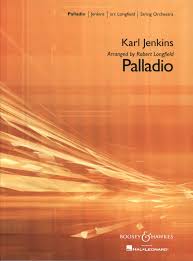
Please, subscribe to our Sheet Music Library.
If you are already a subscriber, please, check our NEW SCORES’ page every month for new sheet music. THANK YOU!
Jenkins was educated in music at Cardiff University and the Royal Academy of Music, and he is a fellow and an associate of the latter. He joined the jazz-rock band Soft Machine in 1972 and became the group’s lead songwriter in 1974. He continued to work with Soft Machine until 1984, but has not been involved with any incarnation of the group since. He has composed music for advertising campaigns and has won the industry prize twice.
For the bulk of his early career, Jenkins was known as a jazz and jazz-rock musician, playing baritone and soprano saxophones, keyboards and oboe, an unusual instrument in a jazz context. He joined jazz composer Graham Collier’s group and later co-founded the jazz-rock group Nucleus, which won first prize at the Montreux Jazz Festival in 1970. In 1971, Jenkins collaborated with Linda Hoyle on her album Pieces of Me, co-writing 8 of the 11 tracks, playing piano and oboe, as well as arranging and conducting the orchestra.
Jenkins has created advertising music, twice winning the industry prize in that field. From the 1980s, he developed a relationship with Bartle Bogle Hegarty, starting with composing musics for their Levi’s jeans “Russian” series. He composed a classical theme used by De Beers diamond merchants for their television advertising campaign focusing on jewellery worn by people otherwise seen only in silhouette. Jenkins later included this as the title track in a compilation called Diamond Music, and eventually created Palladio, using it as the theme of the first movement. Other arrangements have included advertisements for the Renault Clio.
Best Sheet Music download from our Library.
Soft Machine
In 1972, Jenkins joined the Canterbury jazz fusion rock band Soft Machine, playing saxophone, oboe and flute along with keyboard instruments. The group played venues including The Proms, Carnegie Hall, and the Newport Jazz Festival. The album Six, on which Jenkins first played with Soft Machine, won the Melody Maker British Jazz Album of the Year award in 1973. Jenkins also won the miscellaneous musical instrument section (as he did the following year). Soft Machine was voted best small group in the Melody Maker jazz poll of 1974. The albums in which Jenkins performed and composed were Six (1973), Seven (1973), Bundles (1975), Softs (1976), Alive & Well: Recorded in Paris (1978) and Land of Cockayne (1981). Jenkins was the group’s primary composer on Seven and the subsequent four albums.
After Mike Ratledge left the band in 1976, Soft Machine did not include any of its founding members, but kept recording on a project basis with line-ups revolving around Jenkins and drummer John Marshall. Although Melody Maker had positively reviewe
d the Soft Machine of 1973 and 1974, Hugh Hopper, involved with the group since replacing bassist Kevin Ayers in 1968, cited Jenkins’s “third rate” musical involvement in his own decision to leave the band, and the band of the late 1970s has been described by band member John Etheridge as wasting its potential.
Sir Karl Jenkins is one of today’s best-loved composers, named the world’s most popular living composer in the Classic FM Ultimate Hall of Fame in 2015.
The Welsh composer’s musical output has been extraordinarily wide-ranging. While he is now best-known for his choral music, with his works like Adiemus and The Armed Man entering the repertoire of choirs worldwide, Sir Karl had his beginnings in jazz, prog rock and advertising music.
After training at the Royal Academy of Music, in the 1970s he played with Ronnie Scott’s jazz band and in prog rock group, Soft Machine. His eclectic musical background is partly what gives his music its distinctive sound, blurring the lines between classical, global music and jazz.
Last year, his classical harp concerto was heard by millions at The King’s Coronation. At that service he made headlines after being almost inexplicably mistaken for Meghan Markle.
When presenting Sir Karl with one of his many awards, Classic FM once said: “As a composer he recognises no boundaries – musical, commercial, geographical, or cultural. His is a way of thinking and composing that is perfectly in tune with the spirit of the times.”
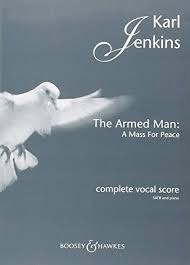
The Armed Man: A Mass for Peace (1999)
Jenkins’ monumental Mass for Peace is his most performed work, presented close to 3,000 times in 50 different countries. In 2023, it achieved 1,000 weeks in the UK Classical chart and placed fifth in the Classic FM Hall of Fame, the highest position for a living composer.
Listen out for the ritualistic, quasi military sound of the ‘Sanctus’, the devastating high cello solo and crashing timpani of the ‘Benedictus’, and the soaring beauty of the ‘Agnus Dei’. A modern mass, with timeless appeal.Adiemus (1993)
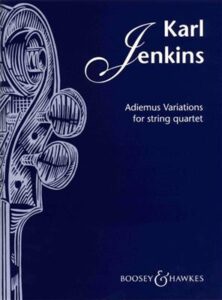
‘Adiemus’ is almost impossible to categorise – which is just as its genre-defying composer would like it. The full-blown choral work, which is written in an invented language, combines classical and ‘world’ music influences to create a haunting, powerful piece that would top charts around the world.
It’s not uncommon for classical music to wind up in TV adverts. But in a more unusual turn of events, Karl Jenkins’ now most famous work was originally commissioned for an advert, for Delta Airlines. Sir Karl himself worked in advertising music for a while, following his stint in jazz and prog rock.
To describe ‘Adiemus’ as a work for sopranos and orchestra, would be to box it into a preexisting form that the Welsh composer would likely challenge.
While its inspirations are gospel and African music, and the percussion part grounds the free-flowing vocals with a tribal-like rhythm, the song uses the forms of European classical tradition – like rondo and ternary.
Jenkins, who is one of the most performed living composers in the world, was commissioned by Delta Airlines in 1994 to write a song for their new television advert.
And so, ‘Adiemus’ was born.
Karl Jenkins writes in his performance note for ‘Adiemus’ that the lyrics are written in “an invented language”.
The text has no meaning per-se, rather the vocals were written as sounds to mimic a musical instrument – the idea being that the listener is more able to focus on the free-flowing vocal phrases.
“The text was written phonetically with the words viewed as instrumental sound, the idea being to maximise the melisma by removing the distraction, if one can call it that, of words,” Jenkins says.
The vocal sounds have a folk quality, and the melodies have been attributed to African-tribal and Celtic-style inspiration.
Some have suggested the lyrics bear an unintentional resemblance to Latin. Jenkins later explained that he made up the word ‘Adiemus’ and was unaware that it roughly translates in Latin to ‘We will draw near’.
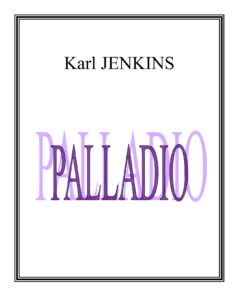
Karl Jenkins Palladio Piano Solo Sheet Music.
Sir Karl wrote ‘Palladio’ in his advertising music era, for De Beers diamonds. Around the same time, he also wrote and conducted a piece for Levi’s jeans.
The work for string orchestra is one of Sir Karl’s most straight ‘classical’ works, inspired by a 16th-century Italian architect Andrea Palladio. From the off, rigid, resolute string lines become the basis for an increasing sense of drama from the higher strings.
Croatian Chamber Orchestra Mojca Ramušćak, Violin JONATHAN GRIFFITH, conductor
00:00 Palladio intro 00:16 1. Allegretto 04:06 2. Largo 10:29 3. Vivace
Requiem (2005)
From Mozart to Verdi, Requiems have been penned by great composers throughout music history. This 2005 setting of the traditional Latin text has all the movements you would expect – a ‘Dies Irae’, a ‘Confutatis’ and a ‘Lacrimosa’. But the Welsh composer’s take is otherwise completely distinctive, with nods to the conventionally Western buried in a melting pot of musical styles from around the world.
Legendary New Zealand soprano Dame Kiri Te Kanawa, who recorded the ‘In Paradisum’, described Sir Karl’s compositions as “the most amazing, haunting music, that is instantly recognisable and loved across the world.”
Stabat Mater (2008)
A dramatic, reflective work, Sir Karl’s setting of the 13th-century prayer is a powerful musical expression of the suffering of Mary, during Jesus’ crucifixion.
The composer wrote it in 2008 for orchestra and choir, with Middle Eastern vocals and ancient instruments. In the recording, singer Belinda Sykes also performs on the duduk, an Armenian reed instrument. Once again, the composer puts his inimitable stamp on a much-touched text, which has been set by the likes of Haydn, Vivaldi and Dvořák before him.
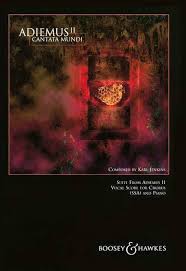
Gloria (2010)
Jenkins’ setting of the Latin Gloria, for chorus and orchestra, was commissioned by the Really Big Chorus for a performance at the Royal Albert Hall. Often performed in tandem with his ‘Te Deum’, both works were recorded with one of Jenkins’ biggest collaborators, the National Youth Choir of Great Britain.
The jewel in its crown is the exquisite ‘Laudamus Te’. If you already love his more famous ‘Benedictus’, give this a try.
Miserere (2019)
Composed as part of the Welsh maestro’s 75th birthday celebrations, the Miserere has a distinctly Middle Eastern flavour. Motivated by the atrocities of war and the millions of people displaced, Sir Karl dedicated the work to all those affected in conflicts in the Middle East over the last 70 years.
It was conducted by Stephen Layton, who said: “It’s rare I find myself singing things over and over again. There is something very enduring and uniquely wonderful here which I love.”
Its most popular moment is the gorgeously haunting ‘Miserere Mei, deus’.
Browse in the Library:
Or browse in the categories menus & download the Library Catalog PDF:
